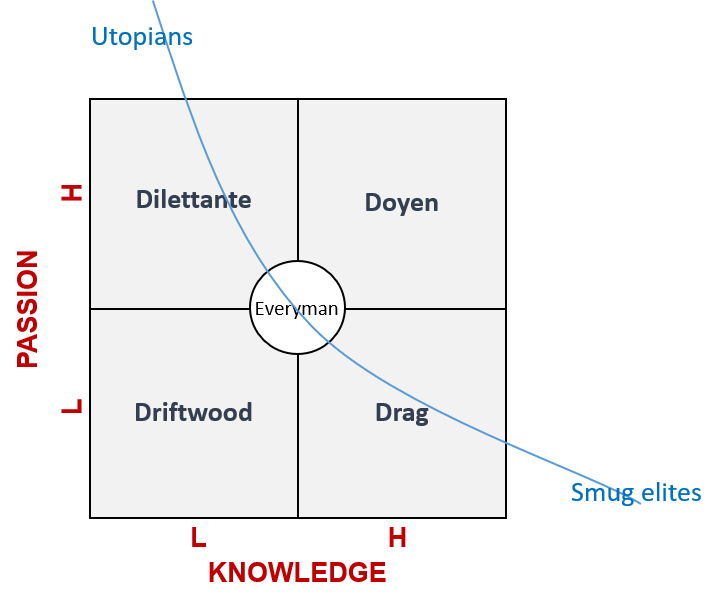The current UK General Election campaign seems to be hammering the final nails into the coffin of British politics. The choices put forward to the electorate effectively coming down to the smug, self-serving liar, the incompetent Marxist, or the rabbit-caught-in-headlights fudger. Whatever the outcome, the future doesn’t look bright. The underpinning problem (Brexit) won’t have been solved, and we’ll be no nearer to solving it. Insert image of a political can being kicked down the road here.
Thinking ahead a few years, to the time when we really hit crisis and decide it is time to re-invent the political system, one thing I’ll be pushing for is a minimum set of skills that anyone standing for election must be able to demonstrate. I’m thinking it needs to be a Masters degree. One that anyone in the country can undertake, paid for by the State. One that is the polar opposite of the sort of ‘political science’ degree on offer to students today, the curricula for which, I note with horror, appear to have a lot to do with why we’re in the mess we’re in right now.
This need for a Masters degree-worth of the right kind of knowledge is not about elitism or meritocracy or any kind of prejudice against ‘non-academic’ people (I firmly believe that everyone is born with the same basic brain physiology that they get to deploy in the direction of one or more of a myriad different kinds of ‘intelligence’ – whether it be IQ, EQ or any of the other thirty-plus different Qs). Rather, it is about ensuring the country is run by people with the requisite set of skills required to do the job. In the same way that I wouldn’t expect a random person off the street to come and re-wite my house, I’d want a qualified electrician. Specifically what I want is to solve the issue first discussed by W. Edwards Deming in his quote, “Best efforts and hard work will not suffice, nor new machinery, computers, automation, gadgets. One could well add that we are being ruined by best efforts put forth with the best intentions but without guidance of a theory of management for optimization of a system.”
A lot of politicians, in other words, enter politics with an admirable level of intent to make a positive difference to the world, the country and their constituents, but have zero knowledge regarding how to achieve those differences. Ditto the civil servants hired to support the politicians. As a consequence, things end up going backwards rather than forwards. Poverty-reduction initiatives that increase poverty, healthcare initiatives that make people less healthy, new education targets that make kids dumber, etc.
Best efforts and hard work often comes across as ‘passion’. Passion without knowledge, unfortunately, as we are all now beginning to see very clearly, is a shortcut to de-stabilisation of not just the political system but the country as a whole. Trust goes down, people don’t bother to vote, extremists rise to the fore, and hey presto, pretty soon no-one can talk to anyone from a different political perspective any more. Which removes even more trust and serves to perpetuate the downward spiral.
It’s perhaps a little harsh to pick out individual examples, but if I had to pick a couple, I’d opt for dilettantes from opposite ends of the left-right political spectrum, Jess Phillips and Mark Francois. Neither could be accused of not being passionate about their beliefs. But both, I believe, are so fundamentally lacking in the necessary knowledge of political, human and societal systems that they become devastation time bombs. There’s a fundamental contradiction that needs to be addressed here. One that looks like this:

Creating a critical mass cohort of political Doyens will undoubtedly be a tough nut to crack. One that will take time. Part of that time, I believe should be spent ensuring that a person is only allowed to stand for election (or take on a supervisory role in the Civil Service) if they possess the requisite skills. Here’s the curriculum as I currently see it. Twelve Modules and a dissertation:
Module 1: Complexity
Complex Adaptive Systems, Cynefin, Complexity Landscape Model, Systems Thinking, Emergence, Law Of System Completeness.
Module 3: S-Curves & The Dynamics Of Discontinuous Change
S-Curves, Tipping Points, All Systems Hit Limits, Types Of Step Change, Pulse-Rates, OODA, Hero’s Journey
Module 3: Human Psychology
Spiral Dynamics, TrenDNA, ABC-M, Matchett 5M Equation, Normal-World/Special-World, Cognitive Biases, Sense-Of-Progress, Skin-In-The-Game, Thinking-Fast-And-Slow/Master-And-Emissary, Psychological Inertia
Module 4: Stop Making Trade-Offs
Revealing Contradictions, Inventive Principles, 9-Windows, Win-Win Solutions, Managing-&-Transcending Contradictions, Trilemmas
Module 5: Patterns Of Evolution
TRIZ, Laws Of System Evolution, Rule Of Three
Module 6: Design-Thinking
Divergence-Convergence Cycles, Failure-Is-Learning, Rapid-Prototyping, Minimum-Viable-Demonstrations, Design Of Experiments, Subversion Analysis
Module 7: Direction & Directionality
Ideal Final Result, Convergent Evolution, AntiFragile, Start-With-Why, Critical-Mass-At-The-Critical-Point
Module 8: Where Have All The Leaders Gone?
Bravery, Wilful Blindness/Plausible-Deniability, Risk-Management, Managing-The-Unknowns
Module 9: How To Measure Anything
(Measuring what is important rather than what is merely convenient), PanSensic, Big-Data-Analytics, The-Meta-Data-Never-Lies-But-You-Need-To-Listen-Differently,
Module 10: The Science Of Reading Between The Lines
Zaltman Metaphor Themes, Culture-Codes, Cultural-DNA
Module 11: Ecology & Environment
Building Meaningful Scenario Models, FMEA, X-Cycles (Carbon, Water, etc), Eco-system Design, The Wide Lens
Module 12: Putting It All Together
Policy Design, Communication-In-A-(Too)-Transparent-World, Re-Thinking History (when we understand complex systems, history and the ‘lessons of history’ need to be completely re-thought), Seven-Habits-Of-Highly-Effective-Politicians
Dissertation: A real-world, get-your-hands-dirty, project, solving a genuine community-based problem using zero (financial) resources.
I’m thinking the whole thing – like our new on-line Systematic Innovation Masters Degree – can be done through distance-learning, the whole thing broken down into bite-size chunks that people can work through during lunch-breaks and after the kids have gone to bed.
I’m also wondering whether journalists also need to complete the programme before they’re allowed to publish. Seeing as they seem to be a big part of the political problem too.
Thoughts welcome.

